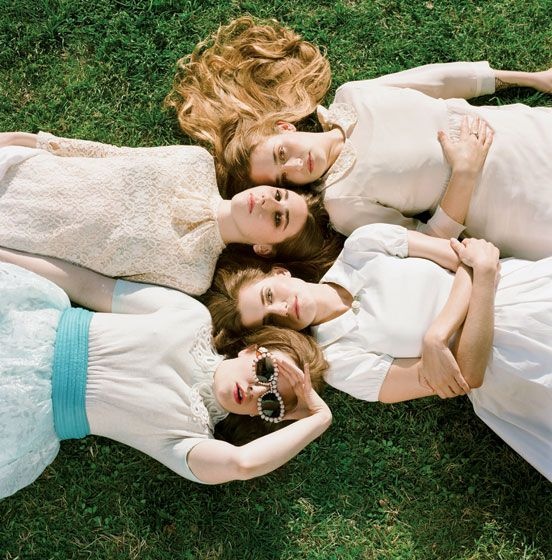 |
Photographs by Autumn De Wilde
Lena Dunham swivels in her leather mini-dress, drops her chin, then lifts her gaze to the lens. It’s the South by Southwest festival’s first-ever launch of a TV series, and buzz has been rising all week, helped along by a clever HBO campaign sending “GIRLS” bicycles around Austin, Texas. In front of the Paramount Theatre, there’s an actual red carpet—something not present when Dunham debuted her breakthrough movie, Tiny Furniture, back in 2010. “Well, this is new,” says Alex Karpovsky, an indie director who appears inGirls, gesturing toward the carpet. “You know, I think I’ll just see where the moment takes me.”
After the familiar HBO logo—hiss, buzz, dissolve—the three episodes begin. The audienceawwws, they hoot; at times the laughter drowns out subtler jokes. Afterward, the show’s three collaborators line up onstage: executive producer Judd Apatow, in a pink polo shirt and sneakers; Jenni Konner, Dunham’s close friend and executive producer; and Dunham herself, the creator, star, writer, and director of Girls. Though she’s hovering on hooflike heels, Dunham has the body language of a very young woman. She holds the mike in one hand and gesticulates with the other, fanning her fingers as if she’s drying nail polish, petting her straightened hair, her toes turning inward.
Yet her answers are confident and thoughtful. At 25, Dunham is at SXSW for the third time. In 2009, she screened a feature she’d filmed while still at Oberlin College, Creative Nonfiction, in which she played Ella, a college student struggling to complete a screenplay. One year later, she returned with Tiny Furniture, as Aura, another version of herself, this time in a post-college funk; her mother, the visual artist Laurie Simmons, played her mother, and her sister Grace played her sister (her father, the artist Caroll Dunham, declined to participate, uncomfortable with the potential violation of his privacy). With its scenes of Dunham wandering pants-free around her parents’ Tribeca loft, Tiny Furniture was, as Paul Schrader says on the Criterion disc, “a good film that pretends to be an amateur film,” an affecting and peculiar self-portrait that made the case for Dunham’s composed mode of intimate self-exposure. It won Dunham the festival’s prize for best narrative feature—along with an unstable blend of worship, envy, and disdain, particularly from her peers, some of whom resented her “voice of a generation” press. Yet tonight, the audience is on her side. Toward the end, a man asks Dunham a reasonable question: Given her success, has it become harder to inhabit a girl like Hannah, who is incapable of doing a job interview without sabotaging it with a rape joke?
“How do I express this without getting too personal with you?” asks Dunham. “That lostness and that questioning—I wish I could say that it completely went away when you were getting to do the thing you wanted to do, but unfortunately, that’s not the truth.” Her work is going gangbusters, she admits—her personal life, those daily mortifications, that’s another matter. “I’m just fuckin’ it up all other kinds of ways.”




